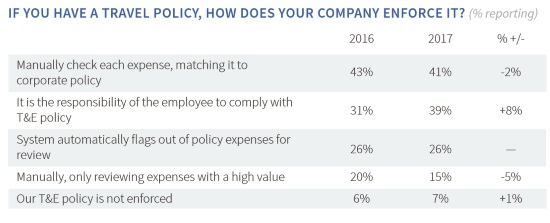
Corporates failing to adopt the tech that can keep out-of-policy travellers in line
By cameron in Uncategorized
Certify‘s 2017 Expense Management Trends report reveals the disconnect between travel policy compliance and enforcement.
Compliance with policy is a recurring issue for corporations and, despite the options that tech provides for businesses to get a grip on maverick road warriors booking the Taj rather than the Travelodge, many businesses are still relying on manual checks or simply assume that business travellers are doing what they are told.
Certify clearly has an interest here – other automated expense solution providers are available – and the 600+ US-based corporations who contributed to its study are “from outside of its customer base”.
Of these 600+ variously sized businesses, 79% have a travel policy in place, fewer than the 85% in its 2016 report. It is not clear whether open booking policies – where travellers have a limit on budget but are not restricted to a specified supplier or booking channel – counts as a policy.
Elsewhere in the study, Certify found that one in four (26%) travel and expenses policies do not have a category spend limit, which sounds like an odd policy to have.
Of the 79% who do have a policy, three quarters leave compliance up to the employee or conduct a manual review.
Certify says:
“This approach essentially leaves enforcement to the hope that every employee will do the right thing, assuming they are aware of policy specifics in the first place, unlike using a system with integrated policy controls and compliance monitoring.”
This is an opportunity for businesses which provide integrated control and monitoring systems, although this industry segment needs to do a better PR job on itself because the proportion of enterprises adopting the manual review/hope approach has increased since 2016.

The situation is compounded by the finding that, even if there is a web-enabled expenses system in place, half (49%) the companies using one don’t bother with the compliance-ensuring functions built in to the product.
As Certify says, these businesses are “missing an opportunity to stop policing employee expense reports and make T&E policy enforcement automatic”.
Automating the enforcement has many benefits, one of which is that any disputes are system-based not personal. If the Taj receipt is rejected or flagged up during the filing, the employee is more likely to rage against the machine rather than his or her line manager.
The obvious answer for this would be for the system to have flagged up that Taj is out of policy at the booking stage. Certify talks about “using an integrated travel-booking tool that syncs with the company expense management platform” as a means of enforcing compliance before the out-of-policy booking takes place.
It also suggests pre-trip approval as a way to enforce compliance.
The theoretical and practical problem around compliance for corporations shows no signs of going away, despite the array of tech options available. But in order for travellers to comply with policy there needs to be a policy in place and with one-in-five not bothering, some of USA plc seems to have given up the fight.
Click here to read Certify’s press release, or here to access a holding page from where the study can be downloaded.
NB: Image by Michael Darcy Brown/BigStock
![]()

